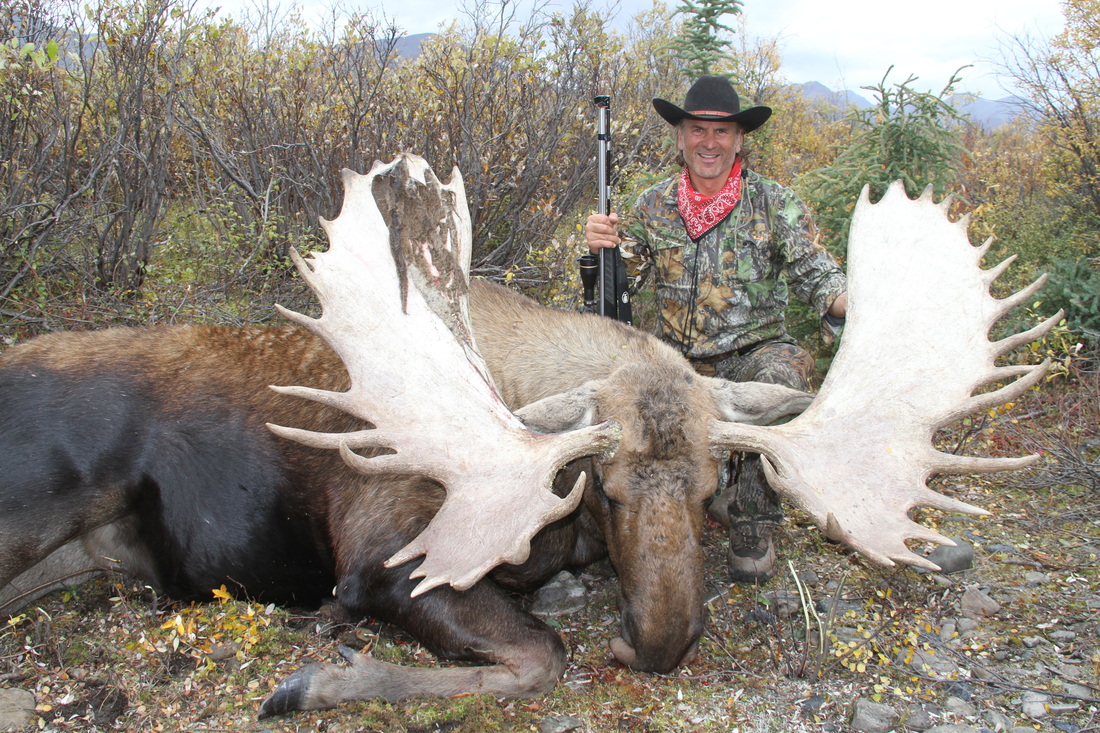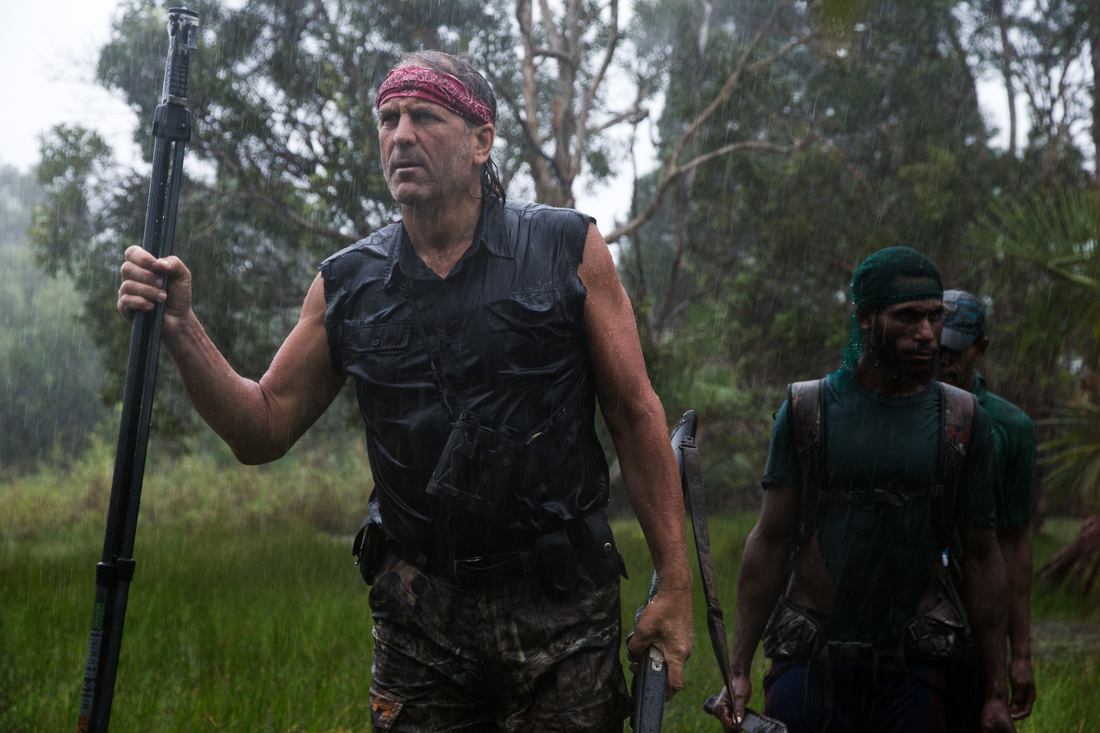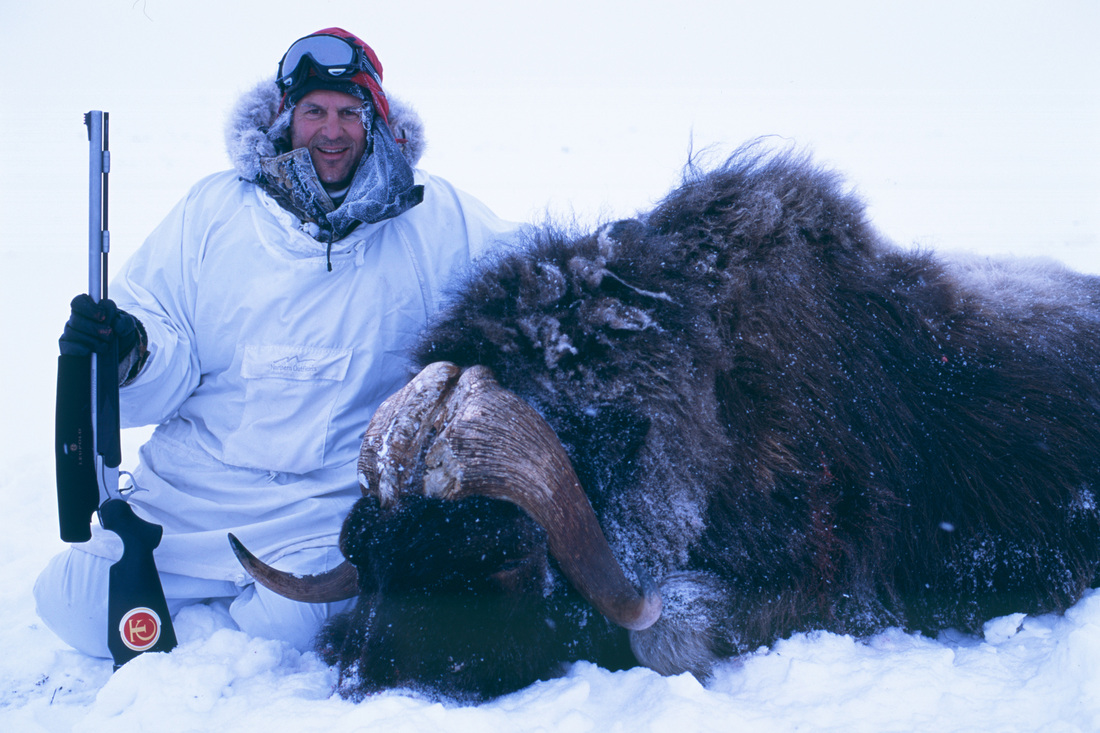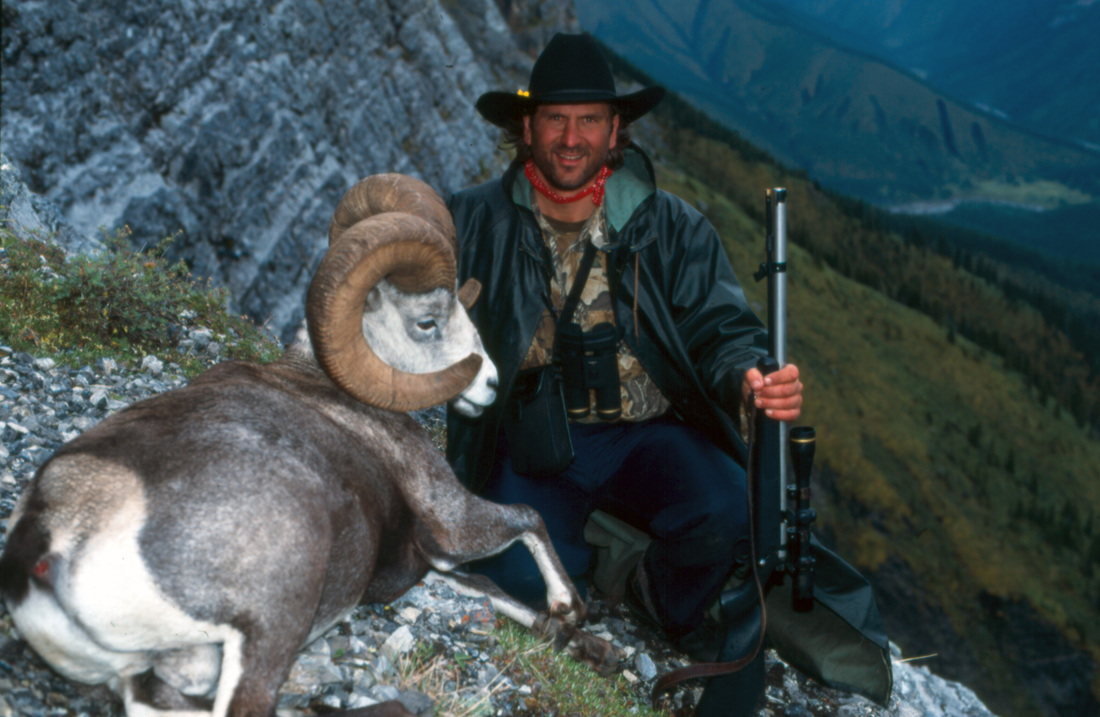The term legend is not one we throw around loosely at the JOMH but in this case it’s the only applicable description of our interviewee. Part Thoreau, part Indiana Jones and pure hunter Jim Shockey is without question one of, if not the most exemplary ambassadors the hunting industry has known for decades. Few hunters in history have been to as many countries and hunted as many species with such success yet such humility as Jim Shockey. A pioneer in the hunting media industry through and through, he and his team continue to stay relevant in a era when programming that involves helicopters, automatic weapons and personalities that could only be described as embarrassing to the true outdoorsman or woman continue to get airtime (ya we said it).
With a unique blend of humour, cultural sensitivity and a truly spiritual connection with the animals and places he hunts Jim is a rare breed in today’s outdoor media indeed. World renowned outfitter, internationally prominent writer and TV personality, successful businessman, and one of the most prolific hunters in modern history, Jim could happily retire to virtually any corner of the world and hunt his days away. And yet, with the release of his latest project Uncharted he and his son Branlin continue to push the boundaries of the conventional hunting show and prove they have few equals in today’s outdoor programming. As you’ll see in the interview below, hunting and the connection it brings to Nature is something so ingrained in Jim’s DNA that it would be impossible for him to slow down any time soon. We were truly honoured to speak with him and we assure you this interview will spark the travel bug in even the most unadventurous souls. If you thought you knew Jim Shockey, his story and his philosophy to hunting, travel and life in general, you’re about to be surprised.

You were born and raised in Saskatchewan, what are your earliest memories of hunting? Was hunting a true passion from the beginning or something you grew into?
I can distinctly remember my first hunting experience around age 2 or 3 “hunting” earthworms in the yard with my father. I just couldn’t get enough of the whole experience, trying to find them and catch them was just enthralling to me. From there it progressed into other creatures like beetles, grasshoppers and then rabbits and of course eventually deer. I shot my first deer at age 14. I honestly believe it’s something I was born with, but I also believe most of us are born hunters in this sense.
So for you hunting was and I assume to an extent still is as much about the immersion in nature and all that’s involved with learning about an animal and its environment and behaviours as it is about the kill itself?
That’s exactly it. Hunting is not purely about the kill. It never was and never will be. Of course, I’ve hunted and killed many animals but the adventures, cultures and experiences involved are in many ways more important than the taking of the animal. Yes, hunting involves killing and death but that’s nature and we’re part of nature so to ignore that fact makes no sense at all. Hunting is part of all of us, everything we do in sport or life can in some way be linked back to hunting and the physical and mental capabilities that hunting bred and grew in our species over human history across virtually all of our cultures. Our very survival as individuals, families, tribes and even nations at one point or another depended on hunting and an immersion in nature and the food chain. To deny that is literally inhuman.
In your bio it says you were a swimmer and National Team water polo player during and after university, where did you attend university and did you hunt while you were in school?
I attended SFU (Simon Fraser University) for 2 years and then transferred to Carleton University for the last 2 years of university due to my National Team commitments and yes I continued to hunt while I was at university. I had my Dad mail my .270 out in a box so I could hunt deer.
Fun fact, the closest I’ve ever been to truly lost in the woods was on a hunt in the Ottawa Valley while I was at Carleton. Navigating the hardwoods and boreal forests of Eastern Ontario certainly wasn’t as easy as I assumed it would be!
In a previous interview you were asked how you got into guide-outfitting and you jokingly said you were unemployable, what’s the real story between university and the purchase of your first guiding territory?
After university I worked in construction for Andre Molnar (the well-known Vancouver condo developer) whom I’d met through water polo and seeing his success, quickly developed grand plans to become a wealthy developer just like him. But this was in the early 80s when interest rates were well into the double digits here in Canada so that didn’t exactly pan out given what happened to the housing market at that time. So I left the construction/development business and opened an antique and collectables store that specialized in ethnocentric folk art from all over Western Canada but really specialized in reproduced or refinished wood furniture from the Prairies usually handmade by Ukrainian or Mennonite craftsmen and eventually expanded into carrying a wide variety of Canadiana antiques, hand carved Folkart and paintings. It was also during this period that I started writing seriously and sold my first article in 1984 to Bowbender magazine, I’d been hunting throughout this post-university period and really enjoyed writing about my adventures so it was a natural fit. One day Ralph Lauren (yes THE Ralph Lauren) walked into my store and bought out the entire inventory. At the time I’d expanded the business to have four stores in Vancouver and he literally bought out our entire inventory which put us in a financial position to purchase our first outfit on Vancouver Island (Pacific Rim Outfitters) which we still own today. That was in 1988.
That’s an incredible lead-up to your first outfitting business! So that was in 1988, and you’ve since expanded into other provinces and countries from an outfitting standpoint but tell us about your foray into TV and film. Was this a calculated decision or was it a more “organic” progression from your writing?
Well it was a bit of both really but there’s no question it was a conscious decision to get into film and TV. By the time we purchased the outfit on Vancouver Island I was writing for many of the American hunting magazines and had built a bit of a “brand” I guess you can call it through my writing style that blended adventure and humour. I always tried to inject humour in a story where possible as what’s life without humour?
As TV networks like ESPN and TNN grew they started to expand into hunting and outdoors focused programming so for me at least, the writing if you will was on the wall. It was a lot of work to write 300 plus stories or articles per year which of course required me to sit at a desk and basically write on a daily basis. Who’s kidding who, I wanted to be out in the field! I quickly decided that telling stories through video was not only where the industry was going but also meant I could spend more time doing what I loved. So in a way, it was a path that was not hard to follow, I could still tell stories, I was in the outdoors all the time, and I was hunting, it essentially represented everything who I was and what I wanted from life. In that regard it was an easy transition. I also determined that the content itself was going to be more important than the image quality of the video or film and since I’d been writing as long as I had I knew we could create and provide content that would be compelling without having to spend huge sums of money on expensive film equipment. So we went out and bought a few camcorders and started filming our hunts. The rest, as they say, is history.
Since then, you’ve been fortunate enough to travel the world hunting and experiencing many foreign cultures and people, out of all the places you’ve been what region or people had the most profound effect on you?
I’d have to say the Omo River Valley in Ethipoia. In many ways it remains the “last frontier” of Africa with many of the peoples and tribes living as they did one to two hundred years ago amongst healthy populations of some of Africa’s most famous game species still thriving in their natural state. Sure, many of the tribespeople now carry AK-47s instead of traditional spears but they continue to live as close to their traditional ways as anywhere I’ve been. Like no other place, it drove home just how quickly we in the West have lost touch with our ancient traditions and ways and our connection with Nature.
It’s also an area threatened by the ever expanding “needs” of an increasingly urban population. Bulldozers and other heavy earth moving machinery are poised to change this incredible landscape forever with a dam planned for the upper reaches of the Omo River that would displace the natural flood cycles of this ecosystem, these tribes, and their way of life. I understand this is the reality of “progress” and the needs of feeding and caring for the 9 billion people that call our planet home but where does it stop? What are we doing to this world in the name of progress? As more and more people move into the cities we lose touch with Nature and our deep connection with it, a connection we’ve had since the dawn of time. After leaving the Omo Valley I found myself questioning, what are we doing to ourselves? It truly had a profound effect on me.
Of all the countries, cultures or people you’ve spent time hunting with who would you say has the most ingrained connection to or cultural emphasis on hunting?
I didn’t have to travel too far to find this, as I’d have to say the Inuit right here in Canada. You go to virtually any village in the Far North and hunting continues to be an important way of life and a truly fundamental part of who they are. On top of this, they maintain an intensely spiritual connection with their lands and the game they pursue so hunting literally permeates all aspects of their culture, it’s actually hard to separate it from the “rest” of their existence, it’s not just a hobby or a past-time or something they do on vacation it really and truly is who they are and they have maintained as deep a connection with this tradition as anywhere I’ve been. Sure, you have to look past the snowmachines and rifles now but the harpoon remains a vital tool to them. When I first traveled to the Arctic back in the early 1990s, many hunters were still using ivory tipped harpoons and in later trips we started to see brass harpoon tips show up that had been scavenged from the propeller blades of old shipwrecks. It was simply incredible to experience a group this in touch with their hunting traditions. You could argue some of the tribes of Western Africa, say in the Congo (as in the Republic of the Congo) or Cameroon or of course the Pygmy’s of Central Africa might qualify but from a spirituality standpoint they are losing that deep connection with Nature and hunting. Hunting has become more and more “transactional” for these cultures and focused on serving the needs of the urban populations as opposed to the needs of the village or the tribe like we see with the Inuit.
For mountain hunters aspiring to travel internationally in pursuit of game, what advice do you have?
Well for one, prepare to spend some serious money, especially when we’re talking about the more sought after mountain species. Hunting internationally, in many areas that were previously affordable has become an endeavour that requires deep pockets. Second, determine what your goals are? Are you travelling for the physical challenge or for the cultural experience? For a physical, true mountain backpack hunt, one that would be comparable to the challenge of hunting sheep or goats here in North America, New Zealand is hard to beat. The terrain is definitely challenging and hunts for tahr or chamois are still relatively affordable. These are of course introduced species in NZ but still offer incredible hunts. There used to be affordable hunts for Ibex in Mongolia and mid-Asian ibex in Kyrgystan are still within reach of many hunter’s budgets but the caprinae species hunts are becoming more and more expensive. From a cultural perspective, Spain is fantastic and a great place to travel with your spouse and combo a hunt with some excellent sightseeing opportunities. There are great hunts for European Mouflon in Spain and although most serious mountain hunters would consider these hunts much easier than what we’re used to North America, there are some excellent bowhunting opportunities for Mouflon if one’s looking for more of a challenge.
It should be noted, if you’re a serious mountain hunter that lives and hunts in British Columbia, Alaska or Alberta you will find nothing internationally that tests you like a mountain hunt for sheep or goats in these provinces or states will. And in my opinion, nothing compares to a true backpack Stone Sheep hunt here in BC. Living out of your pack for 10 -14 days chasing a hard to see sheep in difficult terrain is without question, mentally and physically, the toughest hunt on the planet. If you can do that, you can hunt anything, anywhere.
How did you and your team go about choosing locations for the episodes for your new show Uncharted? Was it a species interest primarily or did the cultural side of the experience play an equal role in selecting the various locations?
The locations were based on my personal interest primarily with the cultural side of the locations playing an important role in the selection process as it usually does. PNG (Papua New Guinea) for example is a place I’ve wanted to hunt forever for numerous reasons so as soon as we found out we could hunt buffalo there, I was all for it. With some of the locations though, I had a more intimate reason for returning. In Paraguay for instance, the last time I was there we lost four of our six dogs chasing jaguar so needless to say I had my own reasons for going back. So really, each and every one of the locations we chose for Uncharted meant something to me on some level more than what would simply make for good programming.
OK last question Jim, this is one of those “what if” scenarios. If you were dropped in the Yukon without food and water, only the clothes on your back, a pack and a weapon of some sort what would you want with you?
Well for one I wouldn’t be too focused on leaving wherever I was dropped. I learned something from the Inuit that has always stuck with me and that’s “home is where you are”. Too many people end up in dangerous situations because they’re too focused on “getting home” and can’t simply accept their circumstances so they panic or make rash decisions and end up in bad situations because of it. It’s something endemic in society today, there’s this constant need to “go”. Very few people can just be present and enjoy what they have at that moment and in that place. So that being said, all I’d need is a good pair of boots, just about any weapon and most importantly a sat phone. Not so I could call for help but so I could call my wife every day and make sure she’s OK and let her know that I’m OK, that would be the most important thing for me. As long as I could check in with her, I’d be just fine wherever I was.
From the Editors:
Jim’s latest project Uncharted does not disappoint. Produced by his son Branlin, the locations, species and production quality will leave you hanging on the edge of your seat and itching for adventure. From his home province of BC to the South Pacific and the storied slopes of Asia, there are few programs that blend such exciting hunt footage with a distinct emphasis on the places and people Jim and his team are fortunate enough to hunt with. It takes a lot to impress us here at the JOMH and in our opinion, this project is one of the best TV programs to hit the outdoor networks in a long, long time. Visit www.jimshockey.com to learn more.




